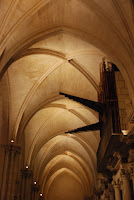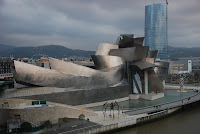 My obsession with Mary statues continue. Michelle is a little concerned with my addiction, and fears that I'm turning Catholic, but we all know their opinions of gingers...
My obsession with Mary statues continue. Michelle is a little concerned with my addiction, and fears that I'm turning Catholic, but we all know their opinions of gingers...


 El Cid's burial place
El Cid's burial place The most pitiful Jesus we've seen thus far.
The most pitiful Jesus we've seen thus far. One of the ceilings in the cloisters looks like a Fabrege egg.
One of the ceilings in the cloisters looks like a Fabrege egg. Some of the relief statues in the cathedral are crumbling and deteriorating because they were made out of limestone.
Some of the relief statues in the cathedral are crumbling and deteriorating because they were made out of limestone. The detailed ceiling work astounds me.
The detailed ceiling work astounds me. The noble couple that were the patrons and donors of the Burgos Catedral, memorialized in marble.
The noble couple that were the patrons and donors of the Burgos Catedral, memorialized in marble. This is a 16th century German clock that still functions within the catedral; every hour the man on top of the clock opens his mouth in rhythm with the chimes, letting you know what time it is.
This is a 16th century German clock that still functions within the catedral; every hour the man on top of the clock opens his mouth in rhythm with the chimes, letting you know what time it is. Our cute, ridiculously skinny tour guide. Check out the fur hat, coat, AND boots.
Our cute, ridiculously skinny tour guide. Check out the fur hat, coat, AND boots.After our short little tour of the Burgos Catedral, we sallied on to Bilbao where we saw the Guggenheim Museum upon our arrival. It's said that prior to the Guggenheim being open to the public in 1997, Bilbao was never on the tourist map; and even though the Guggenheim is highly popular, they say that what's on the outside is better than what's on the inside. Whoever "they" is, they're speaking the truth. Bilbao was beautiful, despite it being cold, and it's a little sad that we only got to spend one night there. Michelle took a trip to Bilbao the weekend I went to Santiago de Compostela, and her knowledge of the city and its history and the Basque people made me want to spend a couple more days exploring.
Although most of the time we spent in Bilbao was overcast and cloudy, once the sun came out you could see that the city of Bilbao is a city encircled by mountains, giving it more of a "Heidi" feel than "Spanish" feel. And hearing Basque being spoken was a delight, but sounds NOTHING like Spanish. Gallician and Catallan, yeah I can see the connections, but Basque, no freaking way. Basque is so obscure and unlike Spanish that linguists have no idea where it originated from--it seems more like Russian or Czech than Spanish, which is odd, but a lot of fun to hear and read.
The more regions I visit, the more I've come to recognize how prominent and different each region is from one another. It's interesting to see that most Spaniards don't consider themselves Spaniards first--they're Madrillenos, or Catalans, or Basques, or Galicians, etc, and THEN Spaniards. Although it seems weird and unpatriotic, it actually makes sense. After learning about their history, it's crazy to see how the country of Spain wasn't really considered Spain until Ferdinand and Isabel brought the kingdoms of Castile (modern day north-central Spain), and Aragon (modern day north-western Spain) together, creating a more unified people and region. The people of Spain have seen so many political changes and battles that it's no wonder why they cling to the region that their family and ancestors came from and not their country, for what's a country if no more than lines drawn on a map, reinforced by politics and power?
Although most of the time we spent in Bilbao was overcast and cloudy, once the sun came out you could see that the city of Bilbao is a city encircled by mountains, giving it more of a "Heidi" feel than "Spanish" feel. And hearing Basque being spoken was a delight, but sounds NOTHING like Spanish. Gallician and Catallan, yeah I can see the connections, but Basque, no freaking way. Basque is so obscure and unlike Spanish that linguists have no idea where it originated from--it seems more like Russian or Czech than Spanish, which is odd, but a lot of fun to hear and read.
The more regions I visit, the more I've come to recognize how prominent and different each region is from one another. It's interesting to see that most Spaniards don't consider themselves Spaniards first--they're Madrillenos, or Catalans, or Basques, or Galicians, etc, and THEN Spaniards. Although it seems weird and unpatriotic, it actually makes sense. After learning about their history, it's crazy to see how the country of Spain wasn't really considered Spain until Ferdinand and Isabel brought the kingdoms of Castile (modern day north-central Spain), and Aragon (modern day north-western Spain) together, creating a more unified people and region. The people of Spain have seen so many political changes and battles that it's no wonder why they cling to the region that their family and ancestors came from and not their country, for what's a country if no more than lines drawn on a map, reinforced by politics and power?
 Before we saw the museum, we first had to cross this amazing bridge that bounced with each step. Good thing I'm not afraid of death by collapsing, and might I add, highly unstable, artsy bridge.
Before we saw the museum, we first had to cross this amazing bridge that bounced with each step. Good thing I'm not afraid of death by collapsing, and might I add, highly unstable, artsy bridge. Frank Gehry's Guggenheim Museum
Frank Gehry's Guggenheim MuseumGhery designed the museum to look like a boat from one side, and had to use a computer program to design the curves and lines of the building so that they were structurally feasible and sound.

 A GIANT spider outside of the Guggenheim. I was just a little freaked. But then we heard about the significance of the spider, and my frightened, fight-or-flight Ron Weasley heart was softened when (through audio tour guide) the artist explained that she made the spider for her mother. She said that her mother was constantly sick when she was growing up, and the spider is meant to represent her mom: it's fragile and delicate, yet strong at the same time.
A GIANT spider outside of the Guggenheim. I was just a little freaked. But then we heard about the significance of the spider, and my frightened, fight-or-flight Ron Weasley heart was softened when (through audio tour guide) the artist explained that she made the spider for her mother. She said that her mother was constantly sick when she was growing up, and the spider is meant to represent her mom: it's fragile and delicate, yet strong at the same time.
 A cool tulip sculpture I found outside of the museum.
A cool tulip sculpture I found outside of the museum.

 If you look closely, you can see my typical museum-going gear: camera bag, purse, and my i-pod (thanks Santa). Sorry I'm not smiling in this pic, but it took me a while to get a decent shot because the reflective surface is curved, I couldn't see what I was taking a pic of, and there was a fierce wind chill blowing through the terrace.
If you look closely, you can see my typical museum-going gear: camera bag, purse, and my i-pod (thanks Santa). Sorry I'm not smiling in this pic, but it took me a while to get a decent shot because the reflective surface is curved, I couldn't see what I was taking a pic of, and there was a fierce wind chill blowing through the terrace. The curvature on this building is out of control
The curvature on this building is out of control
 After I finished the tour of the museum and explored all that I wanted to see, I laid down on some rotund benches to wait another half hour for everyone else to finish. In my supine position listening to my ipod, museum-goers on the other 2 floors in passing would look down and see me staring up at the ceiling and so they'd then wave at me (or just stare, 'cause that happens to me on a daily basis) and mimic taking pictures of me (photography is banned from the Guggenheim). I'm not entirely sure why this happened, but apparently laying down on a bench and staring up at the ceiling is hilarious to Europeans. Also, while observing the ceiling I found a corner support beam held up and wrapped in duct tape, which made me bust up laughing.
After I finished the tour of the museum and explored all that I wanted to see, I laid down on some rotund benches to wait another half hour for everyone else to finish. In my supine position listening to my ipod, museum-goers on the other 2 floors in passing would look down and see me staring up at the ceiling and so they'd then wave at me (or just stare, 'cause that happens to me on a daily basis) and mimic taking pictures of me (photography is banned from the Guggenheim). I'm not entirely sure why this happened, but apparently laying down on a bench and staring up at the ceiling is hilarious to Europeans. Also, while observing the ceiling I found a corner support beam held up and wrapped in duct tape, which made me bust up laughing. Outside one of the entrances of the Guggenheim there's a giant puppy topiary that is full of flowers year round. Instead of calling the statue what it really is, "perrito" which means "puppy", the Spanish call it "puppy". But try pronouncing it with a Spanish accent--yeah, it sounds like they're saying "poopie", which made me think of the high-pitched voice my Dad used to use when he read the book Zack's Alligator to David, Aaron and I before bed: "Come on poopsie! Momma's gonna take you home!" Aaron, I saw this and thought of you--it looks like a giant plant version of Mocha, no? Or maybe what he looked like when he went without a bath for a while?
Outside one of the entrances of the Guggenheim there's a giant puppy topiary that is full of flowers year round. Instead of calling the statue what it really is, "perrito" which means "puppy", the Spanish call it "puppy". But try pronouncing it with a Spanish accent--yeah, it sounds like they're saying "poopie", which made me think of the high-pitched voice my Dad used to use when he read the book Zack's Alligator to David, Aaron and I before bed: "Come on poopsie! Momma's gonna take you home!" Aaron, I saw this and thought of you--it looks like a giant plant version of Mocha, no? Or maybe what he looked like when he went without a bath for a while?

No comments:
Post a Comment